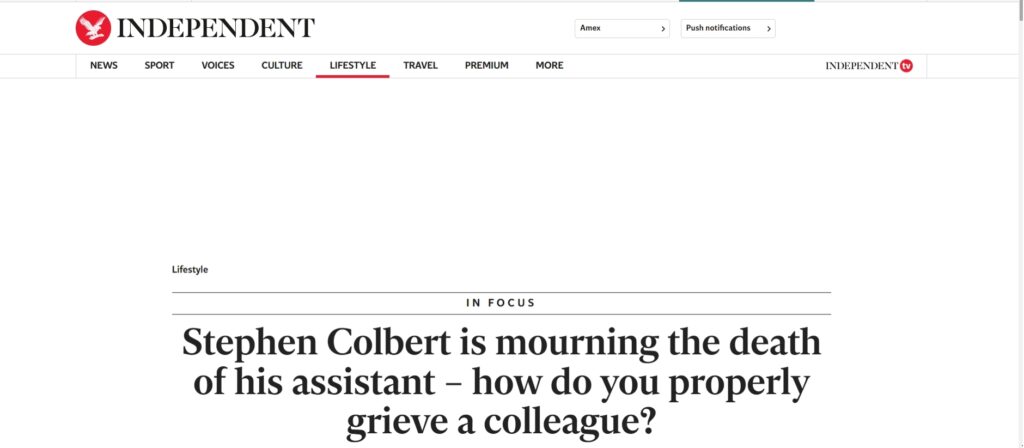I was quoted in an article that appeared in the Independent (attached, by clicking on the image) about grief, and specifically the death of a work colleague. This story followed the news that Stephen Colbert, the Late Show host on CBS in the USA, was mourning the loss during a show of his long-time colleague Amy Cole, that had worked for him for 16 years, who had died a few days earlier at the age of 53. The show ended with a black title card dedicating the episode “to our dear friend”.
The death of a work colleague can be different to the death of a loved one in your personal life, or family, but can be just as intense. After all, we can potentially spend more time with work colleagues than we do with family members, for instance. Such sad news can also be potentially more difficult to process if the passing is unexpected. Such shocking news can fuel a form of existential crisis when we might wonder what life is all about, if someone can be here one day and then gone the next. We might also be anxious about the office space that the deceased person had occupied, what will become of it, and whether a recruitment drive will follow to seek a replacement for their role. Might there be a feeling of an empty chair in the work place, whether that is literally or not?
Grief can trigger stress and potentially reactive depression. You might become tense and irritable and less able to concentrate on your workload. There might also be a risk of burn-out as you struggle to stay focused on day to day activities. A sense of overwhelm is not uncommon.
There are some useful suggestions and resources in the article on how to deal with grief. Essentially, it is important to talk about your feelings, and to have a channel to be able to talk about your loss. There might be formal opportunities to do this by using any resource offered by the company, such as counselling sessions through an employment assistance programme. It is so important to honour their memory as a way of seeking to make sense of what has happened. With the negative impacts of stress it is even more important to try to maintain the key pillars of good physical health, such as eating a healthy diet, keeping a robust physical exercise regime and trying to get quality sleep. These pillars are also the foundation for solid emotional and mental health, but can often be the very things that suffer during stress and grief.
Noel Bell is a UKCP accredited psychotherapist based in London and can be contacted on 07852407140.

